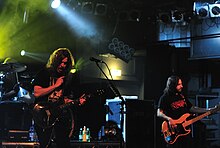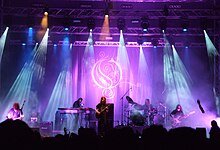Opeth
[2] The band incorporates folk, blues, classical, and jazz elements into its usually lengthy compositions, as well as strong influences from death metal, especially in their early works.
With their eighth studio album, Ghost Reveries (2005), the band achieved chart success in several dozen countries, including Top Ten in Sweden.
[9] Isberg asked former Eruption band member and guitarist Mikael Åkerfeldt to join Opeth as a bassist, replacing Martin Persson.
Unsatisfied with Opeth's slow progress, Döring and Dimeo left the band after their first performance,[7] and were replaced by guitarist Kim Pettersson and bassist Johan De Farfalla.
After the next show, De Farfalla left Opeth to spend time with his girlfriend in Germany, and was initially replaced by Mattias Ander, before Åkerfeldt's friend Peter Lindgren took on the role of bassist.
Rhythm guitarist Kim Pettersson left following the band's next performance, and Lindgren switched to guitar, with Stefan Guteklint taking over the role of bassist.
[11] After a few live shows in the United Kingdom, Opeth returned to the studio in March 1996 to begin work on a second album, again produced by Dan Swanö.
[20] With a larger recording budget from Century Media, Opeth began work on its third album, with noted Swedish producer Fredrik Nordström, at Studio Fredman in August 1997.
"[23] As explained by Åkerfeldt, Still Life is a concept album: "The main character is kind of banished from his hometown because he hasn't got the same faith as the rest of the inhabitants there.
"[21] Following a few live dates in Europe, Opeth returned to Studio Fredman to begin work on its next album, with Porcupine Tree's Steven Wilson producing.
[25] In support of Blackwater Park, Opeth embarked on its first world tour, headlined Europe for the first time, and made an appearance at the 2001 Wacken Open Air festival in Germany, playing to a crowd of 60,000.
"[28] After recording basic tracks, the band moved production to England to first mix the heavy album, Deliverance, with Andy Sneap at Backstage Studios.
[29] AllMusic stated, "Deliverance is altogether more subtle than any of its predecessors, approaching listeners with haunting nuances and masterful dynamics rather than overwhelming them with sheer mass and complexity.
"[30] Opeth performed a one-off concert in Stockholm, then returned to the UK to finish recording vocals for the second of the two albums, Damnation, at Steven Wilson's No Man's Land Studios.
[31] Although Åkerfeldt believed the band could not finish both albums, Opeth completed Deliverance and Damnation in just seven weeks of studio time, which was the same amount spent on Blackwater Park alone.
[36] Lopez promised that he would return to the tour as soon as he could, but two shows later Opeth asked Strapping Young Lad drummer Gene Hoglan to fill in.
[39] Opeth recorded at Fascination Street Studios in Örebro, Sweden, from 18 March to 1 June 2005, and released the resulting Ghost Reveries on 30 August 2005, to critical acclaim and commercial success.
Ghost Reveries was re-released on 31 October 2006, with a bonus cover song (Deep Purple's "Soldier of Fortune"), a DVD featuring a 5.1 surround sound mix of the album and a documentary on the making of the record.
"I feel that I simply have lost some of the enthusiasm and inspiration needed to participate in a band that has grown from a few guys playing the music we love to a worldwide industry.
[54] In 2010, Opeth wrote and recorded the new track, "The Throat of Winter", which appeared on the digital EP soundtrack of the video game, God of War III.
[59] The band announced on their website that they would start recording their tenth album on 31 January 2011, at the Atlantis/Metronome studios in Stockholm, once again with Jens Bogren (engineering) and Steven Wilson from Porcupine Tree as co-producer.
[66] Relieved that Méndez was not interested in doing another conventional Opeth album, Åkerfeldt scrapped the two songs and started the writing process over in a different style.
[70] During the tour, Opeth played with bands such as Katatonia, Pain of Salvation, Mastodon, Ghost and Anathema all over the world in countries such as the United States, Europe, Turkey, India, Japan, Greece, Israel, Latin America and Sweden.
[79] The Guardian reviewed Pale Communion positively, calling it "strange, intricate prog-metal genius" somewhat flawed by Åkerfeldt's indulgent vocal styling.
[citation needed] On 16 November 2021, it was announced that longtime drummer Martin Axenrot had left the band due to conflict of interests and his refusal to get vaccinated against COVID-19,[97] and was replaced by Sami Karppinen for the North American tour.
[99] On 1 August 2024, Opeth announced that their fourteenth studio album The Last Will and Testament would be released on 11 October,[100] although the date was postponed to 22 November due to manufacturing delays.
He was influenced at a young age by the 1970s progressive rock bands King Crimson, Yes, Genesis, Camel, P.F.M., Hawkwind, and Gracious,[102] and by heavy metal bands such as Iron Maiden, Slayer, Death, Black Sabbath, Deep Purple, Celtic Frost, King Diamond, Morbid Angel, Voivod,[103] and, most importantly, Judas Priest.
[110] Ryan Ogle of Blabbermouth described Opeth's sound as incorporating "the likes of folk, funk, blues, '70s rock, goth and a laundry list of other sonic oddities into their trademark progressive death style.
"[3] In his review of Opeth's 2001 album Blackwater Park, AllMusic's Eduardo Rivadavia wrote, "Tracks start and finish in seemingly arbitrary fashion, usually traversing ample musical terrain, including acoustic guitar and solo piano passages, ambient soundscapes, stoner rock grooves, and Eastern-tinged melodies—any of which are subject to savage punctuations of death metal fury at any given moment.
"[25] A number of artists and bands have cited Opeth as an influence, among which are Mayan (a project of Mark Jansen from Epica),[114] Luc Lemay of Gorguts,[115] Soen (a band of former Opeth drummer Martin Lopez),[116] Tor Oddmund Suhrke of Leprous,[117] Disillusion,[118] Caligula's Horse,[119] Klimt 1918,[120] Daniel Droste of Ahab,[121] Becoming the Archetype,[122][123] Nucleus Torn,[124] Alex Vynogradoff of Kauan,[125] Wastefall,[126] Eric Guenther of The Contortionist,[127] Thomas MacLean and To-Mera,[128][129] The Man-Eating Tree,[130] Nahemah,[131] Vladimir Agafonkin of Obiymy Doshchu,[132] Schizoid Lloyd,[133] Native Construct, Maxime Côté of Catuvolcus,[134] Bilocate,[135] and Jinjer.







